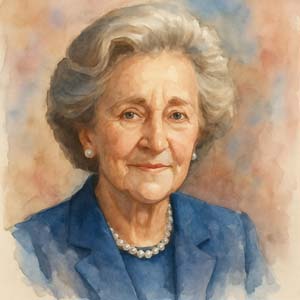— Katharine Graham
 Extraordinary newspaperwoman Katharine Meyer Graham (1917–2001) was born in New York, the daughter of a wealthy businessman whose Jewish roots could be traced to France during Napoleon's reign.
Extraordinary newspaperwoman Katharine Meyer Graham (1917–2001) was born in New York, the daughter of a wealthy businessman whose Jewish roots could be traced to France during Napoleon's reign.
In 1939, she joined her father’s paper, The Washington Post. Nine years later, she bought it from him and built it into a national institution. Under her leadership, it became a Fortune 500 company and a cornerstone of investigative journalism.
"Once, power was considered a masculine attribute. In fact, power has no sex," she declared.
With courage, she steered the Post through its defining moment: Watergate. The story began as a whisper, but with relentless integrity, her newsroom helped unravel a presidency and won the Pulitzer Prize in 1973.
She wrote, "As a story, Watergate was a journalist’s dream — although it didn’t seem that way when we were so alone."
When Graham stepped down in 1993, the empire she built was $1.85 billion strong. Her leadership shattered glass ceilings and shaped an era of truth-seeking journalism.
Let us remember the importance of truth and service—about digging deep, asking hard questions, and shining light where it's needed. That spirit—what Katharine Graham embodied—is a celebration of character and heart.
 Love what you do—and lead with heart and conviction. 💫
Love what you do—and lead with heart and conviction. 💫
